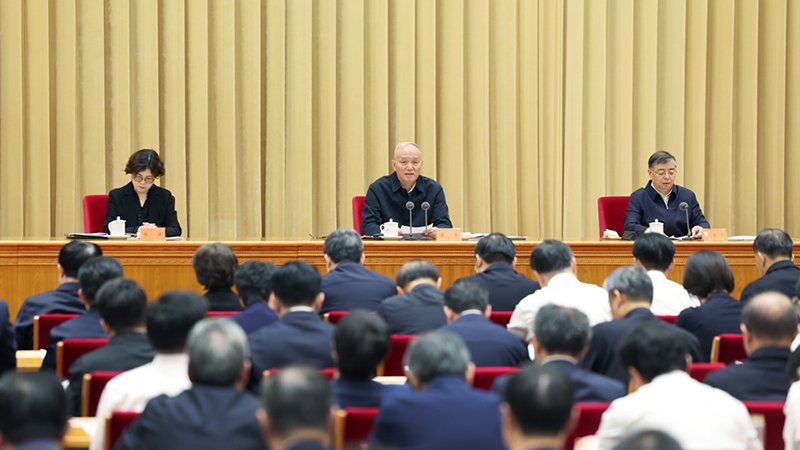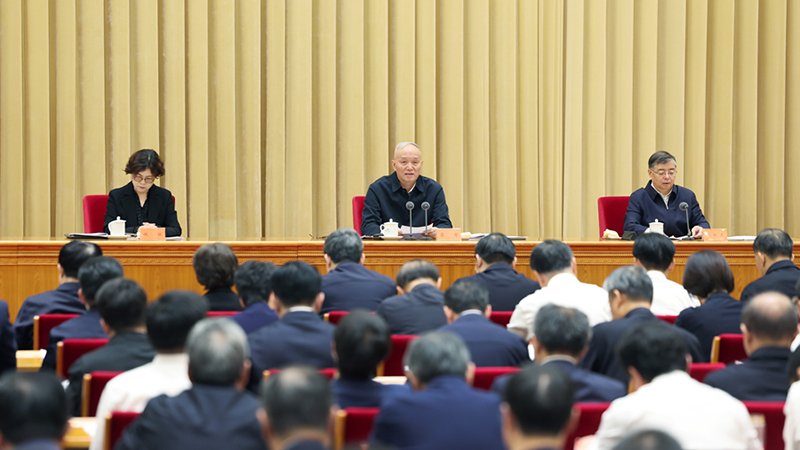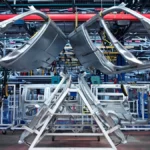
“Those who understand change with the times, and those who know adapt to the circumstances.” Reform and opening up is a key move that determines the destiny of contemporary China and is the most distinctive feature of contemporary China. The Third Plenary Session of the 20th Central Committee of the Communist Party of China is about to be held. This conference closely follows the theme of promoting Chinese-style modernization, focuses on comprehensively deepening reform, takes economic system reform as the center, promotes reform through opening up, deeply responds to the people’s expectations, and has attracted much attention at home and abroad. In the context of major changes unseen in a century and the wave of anti-globalization, it is of great significance how to fully unleash all kinds of development vitality through reform, promote Chinese-style modernization, and inject more certainty into an uncertain world. Ta Kung Pao will launch a series of special topics titled “Forecast of the Third Plenary Session of the CPC Central Committee” starting today, providing in-depth interpretation and systematic analysis through interviews with scholars and special reports. Thank you for your attention!
The Third Plenary Session of the 20th Central Committee of the Communist Party of China is about to be held, attracting worldwide attention. Lin Shangli, President of Renmin University of China and Dean of the National Academy of Development and Strategy, pointed out that the current reform is centered around high-quality development and high-level opening up, and there must be more dynamic and creative development, so it is important for grassroots and all aspects to Make higher demands. He made a comprehensive judgment and pointed out that the “two forces” of liberating productive forces and enhancing social vitality are the core of reform. If the Third Plenary Session of the 18th Central Committee of the Communist Party of China resolved the decisive role of the market in resource allocation, then the current development of new productive forces depends on innovation, and only Only by truly unleashing innovation can reform be deepened step by step.
Since the Third Plenary Session of the Eleventh Central Committee of the Communist Party of China in 1978, China’s development has always taken reform and opening up as the basic path of development. In the course of more than 40 years of development, each Third Plenary Session of the Central Committee of the Communist Party of China has promoted the entire development process at different levels and in different fields. China’s development.
“The iconic themes of the Third Plenary Session of the Central Committee of the Communist Party of China are all centered around reform.” Lin Shangli said in an exclusive interview with Ta Kung Pao. “So far, there have been two Third Plenary Sessions of the Central Committee that have created an era, and one was the Third Plenary Session of the 11th Central Committee of the Communist Party of China. We call the new historical period a new era; the second is the Third Plenary Session of the 18th CPC Central Committee, which ushered in a new era of socialism with Chinese characteristics. I believe that this time the Third Plenary Session of the CPC Central Committee will usher in a new process of Chinese-style modernization, and it will also be a new era of socialism with Chinese characteristics. Historically significant.”
This think tank, who has participated in the drafting of important party reports for many times, pointed out that Chinese-style modernization is a key historical journey to achieve the great rejuvenation of the Chinese nation. Basically building a modern country in 2035 and fully building a modern and powerful country in 2050 is the goal of the Chinese people. It has been a dream for hundreds of years. To realize such a dream, we must have high-quality development, and we must have more dynamic and creative development.
Development must be promoted by liberating the “two forces”
Lin Shangli believes that the core of the current reform is actually two liberating issues. One is liberating and developing productive forces, that is, how to fully release new productive forces, have an effect on the entire economic and social development, and build a production system that is compatible with the development of new productive forces. relationship and governance form; the second is to liberate and enhance social vitality, which is related to social fairness and justice that is closely linked to the economy, as well as people’s livelihood security.
“China’s development to this day is driven by these ‘two forces’, namely productivity and social vitality. It is through liberating the ‘two forces’ that we can maintain China’s sustained, stable and effective development.” Lin Shangli continued, that these “two forces” Where does it come from? It comes from continuous reforms and from the release of institutional innovation through reforms, so that the various institutional obstacles faced by the “two forces” are eliminated. “China’s reform has its own internal logic. The basic idea emphasized and implemented in central documents is to continue China’s reform to the end. This not only has the tasks and thematic missions of the new era, but it also has the same ideas and principles.”
It is expected to involve four aspects of issues
Focusing on liberating the two forces, Lin Shangli pointed out in detail that the upcoming Third Plenary Session of the 20th Central Committee of the Communist Party of China is expected to involve the following four issues: The first is innovation. How can we solve the problem of China’s development of innovation capabilities? Without innovation capabilities, reforms cannot implement the strategy of rejuvenating the country through science and education. If the strategy of rejuvenating the country through science and education cannot be implemented, high-quality development cannot be guaranteed. The report of the 20th National Congress of the Communist Party of China particularly emphasized rejuvenating the country through science and education, which involves the reform of the science and technology system, the reform of the talent system, and the reform of the education system. This is the key. The core of high-quality development is innovation, and the core of new-quality productivity is also innovation. “If reform cannot solve the problem of innovation, it will be difficult for reform to grasp the key points, so this can be clearly judged.”
The second is the market. The market must be dynamic, the market must be integrated, and the domestic market and the international market must be linked. The rationale is also very clear for how to release the market’s decisive role in resource allocation. With the vitality of innovation and the vitality of the market, it is impossible for a country not to prosper. The direction of subsequent market reforms can be seen from the report of the 20th National Congress of the Communist Party of China.
The third is governance. How to keep the entire country’s governance and development, and people’s livelihood protection in an orderly manner, so that China’s governance can continue, promote development through governance, and require efficiency and quality in governance. This is what the reform needs to further standardize, such as solving issues of fairness and justice, solving employment issues, etc. The fourth is people’s livelihood and happiness. People’s livelihood issues involve food, clothing, housing, transportation, medical security, urban-rural integration, rural revitalization, education and employment, and other related issues. This is a critical task for China’s reform and opening up.
“After exploration and paying a price, we finally found the path of socialism with Chinese characteristics. Behind this consciousness, the biggest consciousness is that we fully realize that socialism with Chinese characteristics and China’s development must seek new impetus through constant change. Expand new space, create new systems and mechanisms, and win new development opportunities. Therefore, reform and opening up is a very important code for the path of socialism with Chinese characteristics,” Lin Shangli said.
Participating in the construction of the Bay Area, Hong Kong will participate in the country’s take-off
Talking about Hong Kong’s development prospects in the future national reform and opening up, Lin Shangli pointed out that integrating into the national overall situation is the biggest opportunity for Hong Kong’s development and the largest strategic space. The mainland not only has a vast market but also a large number of talents. The entire national strategy also provides Hong Kong with huge international space and an international stage for its development.
Lin Shangli believes that the construction of the Guangdong-Hong Kong-Macao Greater Bay Area provides a very important strategic measure for Hong Kong to integrate into the national strategy. Many countries rely on the construction and development of the Bay Area to achieve national development and take-off. So in this sense, as Hong Kong integrates into the construction of the Greater Bay Area, Hong Kong will also participate in the historical process of the country’s take-off.
Hong Kong still has two irreplaceable unique advantages: First, it has its unique advantages in terms of internationalization and international rules, and its international participation. Second, it also has its unique advantages in finance and talent gathering. At the same time, Hong Kong is also an important bridge between Chinese and Western cultures. “This advantage will not fade with the changes of the times. As long as Hong Kong develops, this advantage will become stronger and stronger. Both the development of the country and the construction of the Greater Bay Area require this advantage.”
Looking forward to the future development of Hong Kong, Lin Shangli emphasized that Hong Kong has a huge world. In a certain sense, whether it is the Loop or Shenzhen, it is not only the support for Hong Kong’s development but also the hinterland of Hong Kong’s development. Everything depends on how Hong Kong forms the overall pattern of Hong Kong in the national development strategy, that is, the formation of Hong Kong’s development. Generous.
Promote institutional openness and better integrate with the world market
“After entering the new era, China has adapted to the new situation and grasped new characteristics, and our country has promoted the transformation from openness based on the flow of goods and factors to openness based on rules and other institutions.” Talking about institutional opening, Lin Shangli pointed out that the so-called institutional opening refers to opening up At a deeper and more substantive level, that is, how to develop in accordance with the basic rules of China’s economic and social development and the development of today’s world, and give full play to the effect of China’s large market and better integrate with the world market. At the same time, it will also better connect China with the world’s market economy operating practices, so that the flow of capital, the exchange of technology, the protection of intellectual property rights, and in the process, business and legal system norms can reach a higher level.
“Foreign capital, technology, knowledge, enterprises, etc., can be operated and developed in China with good institutional regulations and legal protection. This is a very basic strategic move for China to face the world, and it is also something that a large and open country should improve. and development.” Lin Shangli said that China’s opening up has organically connected itself with the world into one big market, realizing a new development system in which domestic circulation and international circulation are linked. Such institutional opening makes the Chinese market and the world market, and Chinese enterprises and The exchange of world enterprises, technology and knowledge is smoother and more secure.
China’s market economy is not closed but is connected to the world. How to integrate the various institutional rules in the market also requires reform. In a certain sense, the emphasis on institutional openness is not simply a market issue and a spatial issue, but an emphasis on reform and opening itself to the level of formulating rules and specific institutional norms. If it is built well, then international capital and global cooperation will There is an institutional platform and legal guarantee for exchanges, and there is a good connection. This is a requirement of reform.
He continued that as a modern powerful country, China should also contribute to human society in terms of institutions and mechanisms, and provide new governance mechanisms and new operating rules for the world market. If China’s opening up can reach such a level, the world will benefit not only from China’s market but also from new institutional rules, new certainty, and stability. Therefore, the meaning of institutional openness is very rich.
Continuously promote reforms to make the system more effective and reasonable
Lin Shangli pointed out that the history of reform and opening up is brought about by development, exploration, and inspiration from success. It is also the magic weapon behind the Chinese Communist Party finding the path of socialism with Chinese characteristics. Without reform and opening up, there would be no today and no future.
Lin Shangli said that in the new era, China has continued to promote reform through system construction and established a deepening reform committee. Before the 19th National Congress, meetings were held monthly, with the general secretary personally promoting reforms. After the 19th National Congress, meetings were held every two months to continue to promote reforms. After the 20th National Congress, new comprehensive reforms are being systematically planned. “That is to say, in the entire development process, reform is non-stop, reform is specific, and reform continues in daily development. This is where it is very successful. Continuous reform makes The whole development is constantly unfolding in the reform, making the system more effective, more reasonable, and more dignified. “
Talking about governance in the new era, Lin Shangli believes that the General Secretary has created a new era and raised governance to a new level. This new height lies in the fact that it has a very intelligent and effective theory, system, and strategy for governing the country. The strategy outlined in the 19th National Congress is to have a very grand and stable layout. The “five-in-one” overall layout and the “four comprehensives” strategic layout are coordinated to advance scientifically and effectively. The next step is to strictly govern the party in an all-round way, focusing on both the leadership and the team. The anti-corruption struggle has made the entire team more effective in starting a business. More importantly, it has created a good political environment with integrity and promoted the development of the party’s cause.

Member of the Communist Party of China, Doctor of Laws, Professor. Distinguished professor of the “Changjiang Scholars Award Program”, expert member of the National Teaching Materials Committee, and special government allowance approved by the State Council in 2001.
He is currently the president and deputy secretary of the Party Committee of the Renmin University of China, a representative of the 14th National People’s Congress, and a member of the Foreign Affairs Committee of the 14th National People’s Congress. He once served as Vice President of Fudan University, Secretary General, and Deputy Director of the Central Policy Research Office.
The main research areas
Political theory, Chinese politics, comparative politics.
He has presided over a number of national, provincial, and ministerial-level scientific research projects such as the major project of the National Social Science Fund “Research on the Governing System of the Communist Party of China”.
Published “Domestic Intergovernmental Relations”, “Party Politics and Modernization”, “Political Logic – Principles of Marxist Political Science” (co-author), “Research on Contemporary Chinese Political Forms”, “Chinese Communist Party and National Construction”, “Contemporary Chinese Politics: Fundamentals and Development” and other academic works, and published hundreds of academic papers. The research results have won the first prize of the Ministry of Education’s third China University Humanities and Social Sciences Research Outstanding Achievements Award, the seventh China Colleges and Universities Scientific Research Outstanding Achievements Award (Humanities and Social Sciences Science) third prize, etc.










